必修4 Unit 2 Working the land Grammar 课件(幻灯片28张)
文档属性
| 名称 | 必修4 Unit 2 Working the land Grammar 课件(幻灯片28张) | 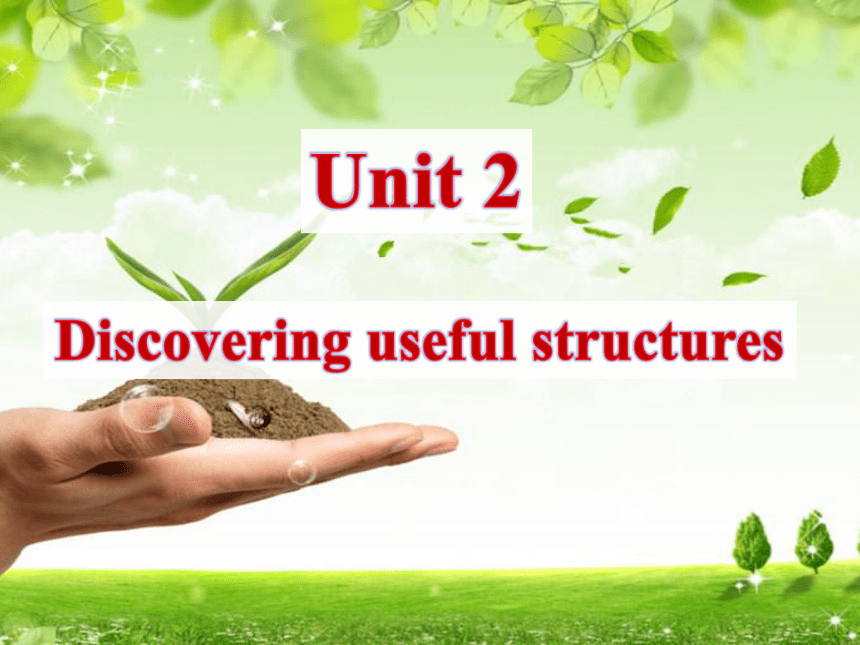 | |
| 格式 | zip | ||
| 文件大小 | 1.4MB | ||
| 资源类型 | 教案 | ||
| 版本资源 | 人教版(新课程标准) | ||
| 科目 | 英语 | ||
| 更新时间 | 2019-11-08 09:19:01 | ||
图片预览

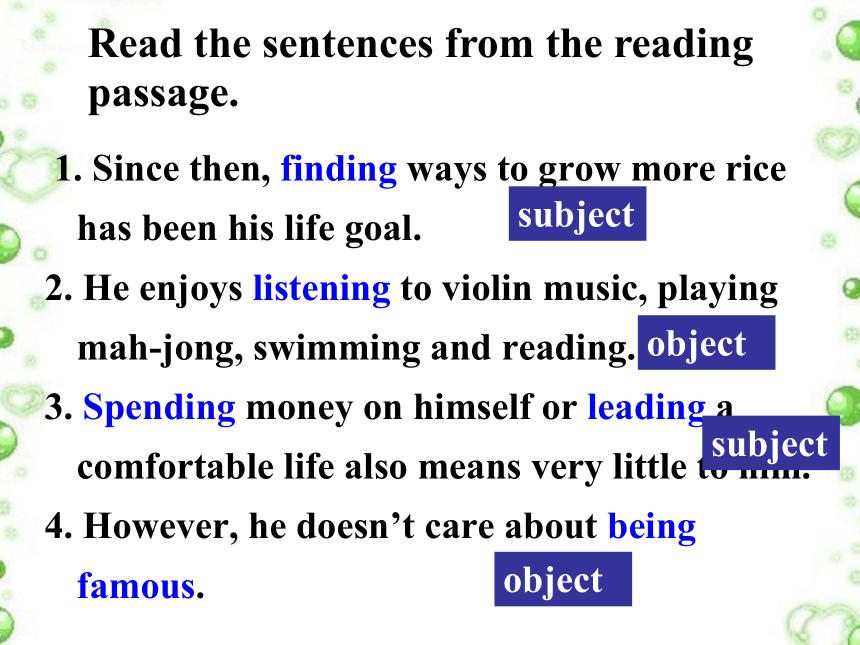
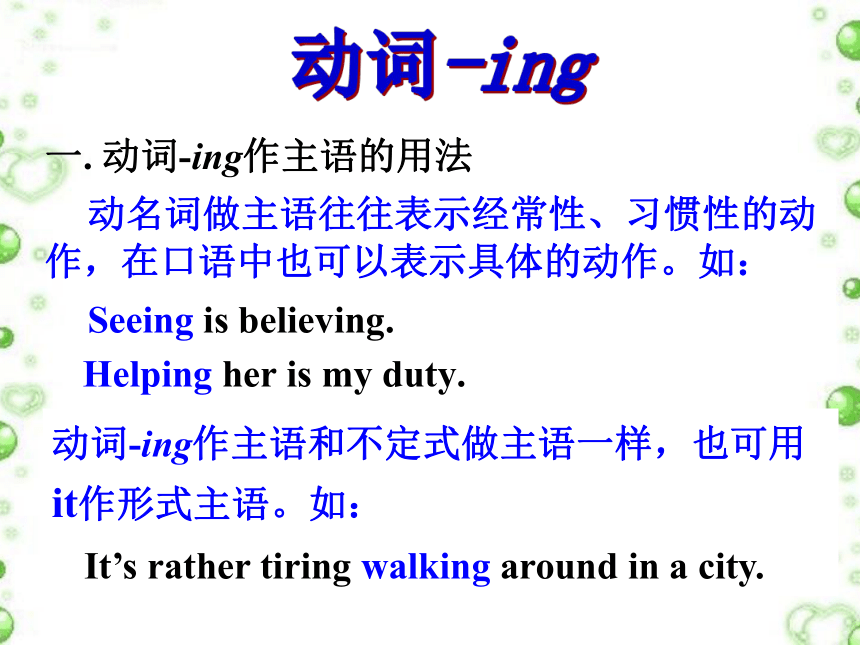
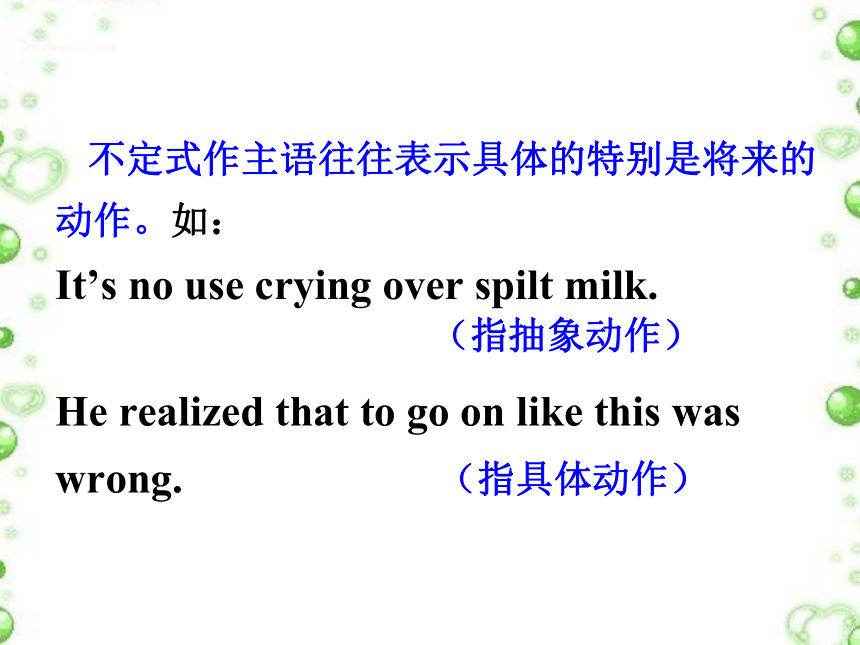


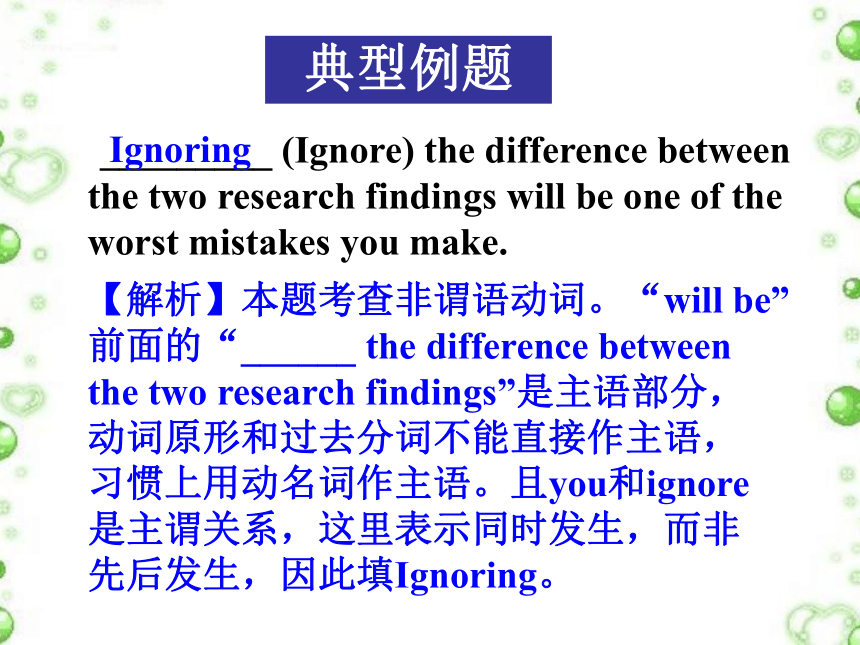
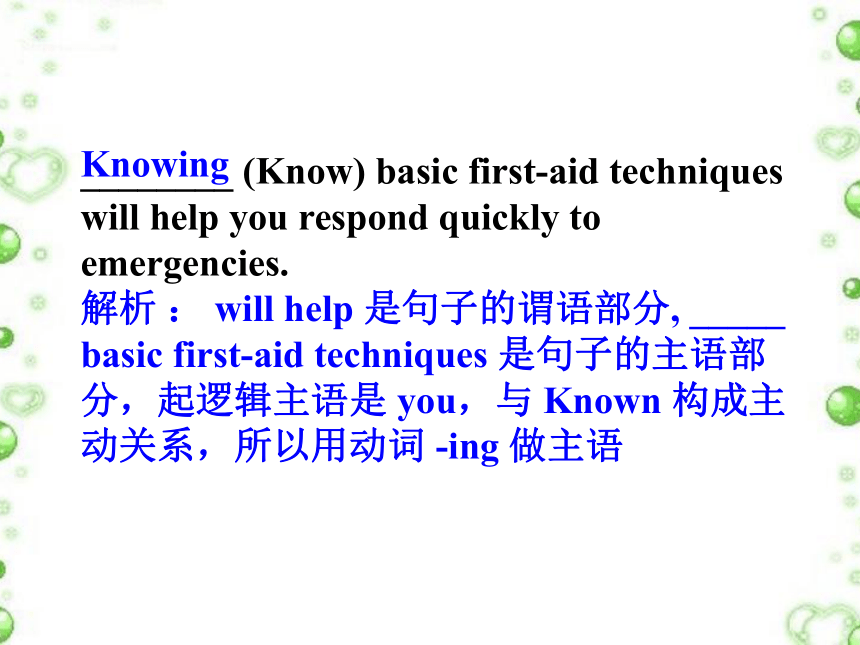
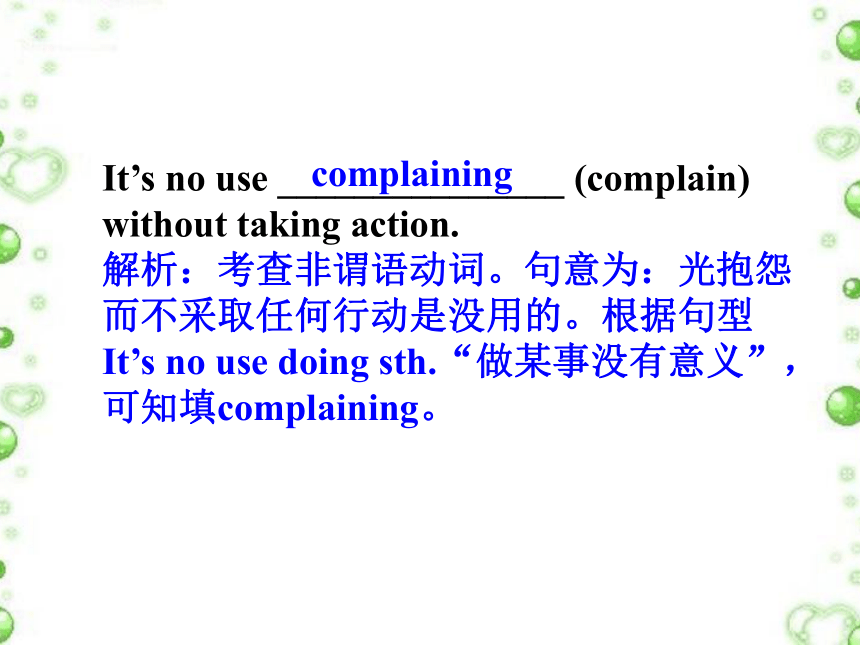
文档简介
(共28张PPT)
1. Since then, finding ways to grow more rice has been his life goal.
2. He enjoys listening to violin music, playing mah-jong, swimming and reading.
3. Spending money on himself or leading a comfortable life also means very little to him.
4. However, he doesn’t care about being famous.
Read the sentences from the reading passage.
subject
subject
object
object
一. 动词-ing作主语的用法
动名词做主语往往表示经常性、习惯性的动作,在口语中也可以表示具体的动作。如:
Seeing is believing.
Helping her is my duty.
动词-ing作主语和不定式做主语一样,也可用
it作形式主语。如:
It’s rather tiring walking around in a city.
不定式作主语往往表示具体的特别是将来的动作。如:
It’s no use crying over spilt milk.
He realized that to go on like this was wrong.
(指抽象动作)
(指具体动作)
注意:
1、 动名词作主语表单数概念,谓语动词用单数形式。
Walking after supper is good for your health.
2、 动名词的复合结构作主语
动名词的复合结构是指物主代词、名词所有格是动名词逻辑上的主语、动名词是其逻辑上的谓语。
Your coming made us happy.
Your father’s cooking is very good.
— What do you think made Mary so upset?
— ________ (Lose) her new bicycle.
解析: losing her new bicycle是句子的主语,谓语made her so upset被省略;losing…在此表示具体的动作。
Losing??
_________ (Ignore) the difference between the two research findings will be one of the worst mistakes you make.
典型例题
Ignoring
【解析】本题考查非谓语动词。“will be”前面的“______ the difference between the two research findings”是主语部分,动词原形和过去分词不能直接作主语,习惯上用动名词作主语。且you和ignore是主谓关系,这里表示同时发生,而非先后发生,因此填Ignoring。
________ (Know) basic first-aid techniques will help you respond quickly to emergencies.
解析 : will help 是句子的谓语部分, _____ basic first-aid techniques 是句子的主语部分,起逻辑主语是 you,与 Known 构成主动关系,所以用动词 -ing 做主语
Knowing
It’s no use _______________ (complain) without taking action.
解析:考查非谓语动词。句意为:光抱怨而不采取任何行动是没用的。根据句型It’s no use doing sth.“做某事没有意义”,可知填complaining。
complaining
二. 动词-ing作宾语的用法
1.有些动词或短语动词后常用动名词作宾语,如admit, appreciate, avoid,can’t stand(不能忍受), consider, delay, mind, devote … to, dislike enjoy, escape, miss (错过), excuse, feel like, finish, forgive, get down to, give up, imagine, insist on, keep (on), look forward to, mention, pay attention to, practice, put off, stick to, suggest等。
注意:
当 need, want, require, worth后面接动词-ing也可以表示被动。
Your hair wants cutting.
The floor requires washing.
That novel is not worth reading.
1. I can’t imagine ________(do) that with them.
2. She looks forward every spring to _______ (walk) in the flower-lined garden.
doing
walking
It’s quite hot today. Do you feel like ______ (go) for a swim?
【解析】本题考察的是固定搭配feel like doing sth想要做某事;动词短语feel like后面只能接动名词做宾语。句义:今天很热,你想要去游泳吗?
典型例题
going
2. 在allow, advise, forbid, permit后直接跟动词-ing作宾语,如果有名词或代词作宾语,则构成“allow/advise/forbid/permit +名词/代词+不定式(宾语补足语) ”的形式。如:
We don’t allow smoking here.
We don’t allow anybody to smoke here.
3. 动词need, require, want意为“需要”时,后跟动名词的主动式或不定式的被动式作宾语,意义没有区别。如:
The window needs/requires/wants cleaning/to be cleaned.
4. 在begin, continue, love, like, hate, prefer, intend, start后用动名词和用不定式作宾语均可,意义没有多大区别。
5. 动词forget, go on, mean, regret, remember, stop, try, be used to, can’t help后跟动名词和跟不定式区别较大,须注意。
forget, regret, remember后跟动名词,动名词表示已经发生的动作;后跟不定式表示将要发生的动作。
1. — Let’s have a rest.
— Not now. I don’t want to stop ______ (study ) yet.
2. — Let me tell you something about the
journalists.
— Don’t you remember ______ (tell) me the story yesterday?
studying
telling
用括号内动词的正确形式填空。
It’s no good _______(try) to remember grammatical rules. You need to practice what you have learned.
2. His illness could mean him ______ (miss) next week’s game.
3. We can never imagine her _______ (pass) the exam, for she has never reviewed the lessons.
4. The suspect (嫌疑犯) at last admitted ??________ (steal) the necklace.
5. I still remember __________ (take) to a concert by Liu Dehua when I was five.
trying
missing
passing
stealing
being taken
1. It took the workmen only two hours to finish ________ (repair) my car.
2. Have you forgotten _________ (borrow) $1,000 from me last month? Will you please remember ________ (bring) it tomorrow?
3. The classroom needs ________ (clean).
Practice
repairing
borrowing
to bring
cleaning
4. Jack said that he wouldn’t mind _______ (wait) for us.
5. My brother keeps _______ (help) me with my work.
6. We should often practise _______ (speak) English with each other.
7. Keep on _______ (try) and you will succeed.
waiting
helping
speaking
trying
8. The story was so funny that we couldn’t help ________ (laugh).
9. Though it sounds a bit too dear, it is worth _______ (buy).
10. He devoted his life to _______ (study) the atomic theory.
11. We are both looking forward to ______ (go on) vacation next week.
laughing
buying
studying
going on
12. You must pay attention to _______ (read) the works of Lu Xun.
13. You should work tonight instead of _______ (watch) TV.
14. The microscope is used for _______ (examine) minute objects.
15. Mike has got used to _______ (stay) up late at night.
reading
watching
examining
staying
16. Once the heart stops ________ (beat), death follows at once
17. We are now busy ________ (prepare) for the examination.
18. I remembered _______ (see) this person somewhere before.
19. The patient must be separated to avoid _______ (infect) others.
beating
preparing
seeing
infecting
20. _______ (Eat) provides us with essential nutrients (营养), while ________ (breathe) provides us with oxygen.
21. He attended the party without _______ (invite).
22. By ______________ (heat), water can be changed into gas.
23. On land many objects prevent sound from _________ (travel) very far.
Eating
breathing
being invited
being heated
travelling
24. She returned home only to find the door open and something ________ (miss).
25. Remember __________ (put back) the newspaper when you have finished it.
26. Writing stories and articles _______ (be) what I enjoy most.
27. He was afraid of ____________ (see) for being late.
missing
to put back
is
being seen
1. Finish exercises in Discovering useful structures.
2. Finish exercises in Using structures in Workbook.
Homework
1. Since then, finding ways to grow more rice has been his life goal.
2. He enjoys listening to violin music, playing mah-jong, swimming and reading.
3. Spending money on himself or leading a comfortable life also means very little to him.
4. However, he doesn’t care about being famous.
Read the sentences from the reading passage.
subject
subject
object
object
一. 动词-ing作主语的用法
动名词做主语往往表示经常性、习惯性的动作,在口语中也可以表示具体的动作。如:
Seeing is believing.
Helping her is my duty.
动词-ing作主语和不定式做主语一样,也可用
it作形式主语。如:
It’s rather tiring walking around in a city.
不定式作主语往往表示具体的特别是将来的动作。如:
It’s no use crying over spilt milk.
He realized that to go on like this was wrong.
(指抽象动作)
(指具体动作)
注意:
1、 动名词作主语表单数概念,谓语动词用单数形式。
Walking after supper is good for your health.
2、 动名词的复合结构作主语
动名词的复合结构是指物主代词、名词所有格是动名词逻辑上的主语、动名词是其逻辑上的谓语。
Your coming made us happy.
Your father’s cooking is very good.
— What do you think made Mary so upset?
— ________ (Lose) her new bicycle.
解析: losing her new bicycle是句子的主语,谓语made her so upset被省略;losing…在此表示具体的动作。
Losing??
_________ (Ignore) the difference between the two research findings will be one of the worst mistakes you make.
典型例题
Ignoring
【解析】本题考查非谓语动词。“will be”前面的“______ the difference between the two research findings”是主语部分,动词原形和过去分词不能直接作主语,习惯上用动名词作主语。且you和ignore是主谓关系,这里表示同时发生,而非先后发生,因此填Ignoring。
________ (Know) basic first-aid techniques will help you respond quickly to emergencies.
解析 : will help 是句子的谓语部分, _____ basic first-aid techniques 是句子的主语部分,起逻辑主语是 you,与 Known 构成主动关系,所以用动词 -ing 做主语
Knowing
It’s no use _______________ (complain) without taking action.
解析:考查非谓语动词。句意为:光抱怨而不采取任何行动是没用的。根据句型It’s no use doing sth.“做某事没有意义”,可知填complaining。
complaining
二. 动词-ing作宾语的用法
1.有些动词或短语动词后常用动名词作宾语,如admit, appreciate, avoid,can’t stand(不能忍受), consider, delay, mind, devote … to, dislike enjoy, escape, miss (错过), excuse, feel like, finish, forgive, get down to, give up, imagine, insist on, keep (on), look forward to, mention, pay attention to, practice, put off, stick to, suggest等。
注意:
当 need, want, require, worth后面接动词-ing也可以表示被动。
Your hair wants cutting.
The floor requires washing.
That novel is not worth reading.
1. I can’t imagine ________(do) that with them.
2. She looks forward every spring to _______ (walk) in the flower-lined garden.
doing
walking
It’s quite hot today. Do you feel like ______ (go) for a swim?
【解析】本题考察的是固定搭配feel like doing sth想要做某事;动词短语feel like后面只能接动名词做宾语。句义:今天很热,你想要去游泳吗?
典型例题
going
2. 在allow, advise, forbid, permit后直接跟动词-ing作宾语,如果有名词或代词作宾语,则构成“allow/advise/forbid/permit +名词/代词+不定式(宾语补足语) ”的形式。如:
We don’t allow smoking here.
We don’t allow anybody to smoke here.
3. 动词need, require, want意为“需要”时,后跟动名词的主动式或不定式的被动式作宾语,意义没有区别。如:
The window needs/requires/wants cleaning/to be cleaned.
4. 在begin, continue, love, like, hate, prefer, intend, start后用动名词和用不定式作宾语均可,意义没有多大区别。
5. 动词forget, go on, mean, regret, remember, stop, try, be used to, can’t help后跟动名词和跟不定式区别较大,须注意。
forget, regret, remember后跟动名词,动名词表示已经发生的动作;后跟不定式表示将要发生的动作。
1. — Let’s have a rest.
— Not now. I don’t want to stop ______ (study ) yet.
2. — Let me tell you something about the
journalists.
— Don’t you remember ______ (tell) me the story yesterday?
studying
telling
用括号内动词的正确形式填空。
It’s no good _______(try) to remember grammatical rules. You need to practice what you have learned.
2. His illness could mean him ______ (miss) next week’s game.
3. We can never imagine her _______ (pass) the exam, for she has never reviewed the lessons.
4. The suspect (嫌疑犯) at last admitted ??________ (steal) the necklace.
5. I still remember __________ (take) to a concert by Liu Dehua when I was five.
trying
missing
passing
stealing
being taken
1. It took the workmen only two hours to finish ________ (repair) my car.
2. Have you forgotten _________ (borrow) $1,000 from me last month? Will you please remember ________ (bring) it tomorrow?
3. The classroom needs ________ (clean).
Practice
repairing
borrowing
to bring
cleaning
4. Jack said that he wouldn’t mind _______ (wait) for us.
5. My brother keeps _______ (help) me with my work.
6. We should often practise _______ (speak) English with each other.
7. Keep on _______ (try) and you will succeed.
waiting
helping
speaking
trying
8. The story was so funny that we couldn’t help ________ (laugh).
9. Though it sounds a bit too dear, it is worth _______ (buy).
10. He devoted his life to _______ (study) the atomic theory.
11. We are both looking forward to ______ (go on) vacation next week.
laughing
buying
studying
going on
12. You must pay attention to _______ (read) the works of Lu Xun.
13. You should work tonight instead of _______ (watch) TV.
14. The microscope is used for _______ (examine) minute objects.
15. Mike has got used to _______ (stay) up late at night.
reading
watching
examining
staying
16. Once the heart stops ________ (beat), death follows at once
17. We are now busy ________ (prepare) for the examination.
18. I remembered _______ (see) this person somewhere before.
19. The patient must be separated to avoid _______ (infect) others.
beating
preparing
seeing
infecting
20. _______ (Eat) provides us with essential nutrients (营养), while ________ (breathe) provides us with oxygen.
21. He attended the party without _______ (invite).
22. By ______________ (heat), water can be changed into gas.
23. On land many objects prevent sound from _________ (travel) very far.
Eating
breathing
being invited
being heated
travelling
24. She returned home only to find the door open and something ________ (miss).
25. Remember __________ (put back) the newspaper when you have finished it.
26. Writing stories and articles _______ (be) what I enjoy most.
27. He was afraid of ____________ (see) for being late.
missing
to put back
is
being seen
1. Finish exercises in Discovering useful structures.
2. Finish exercises in Using structures in Workbook.
Homework
同课章节目录
